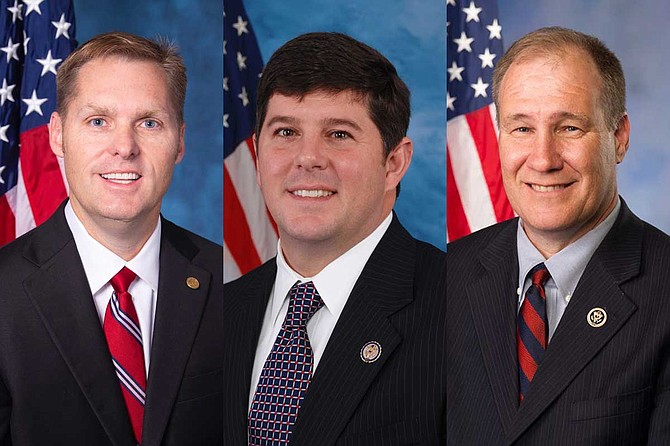All three of Mississippi's Republican representatives in the U.S. House voted against the Violence Against Women Act. Photo courtesy Mississippi Senate
JACKSON — All three Republicans in Mississippi's Congressional delegation voted against renewing the Violence Against Women Act on Thursday. Rep. Bennie Thompson, the state's only Democratic representative in Washington, D.C., was the lone Mississippi congressman who voted in favor of renewing the nearly 25-year-old law.
The VAWA, which Congress first passed in 1994, is a landmark law that provides funding for programs that help prevent and investigate domestic abuse-related crimes. Congress has to reauthorize it about once every five years.
All but 33 Republicans in the U.S. House opposed this year's reauthorization, which the National Rifle Association lobbied heavily against because it bars more abusers from purchasing guns than previous iterations. All but one Democrat voted for reauthorization.
Republicans Oppose LGBT Protections
Rep. Michael Guest, who represents the 3rd Congressional District, "would be more than happy to reauthorize a version of the Violence Against Women Act," but could not support certain "add-ons" in the 2019 bill, said Rob Pillow, Guest's communications director.
"There are some programs included in that bill that the congressman just could not support," Pillow told the Jackson Free Press on Thursday.
When asked for specifics, Pillow said the aspects of the bill that Guest opposed were "the ones that eliminate protections for faith-based institutions and the ones that restrict tools that are used by our court system that are helpful in bringing people to justice."
Pillow did not elaborate on what those provisions are, but presumably, he was in part referring to an anti-discrimination provision.
In testimony before a House committee on March 7, Julia Beck, an anti-LGBT activist who is also a lesbian, said she opposed the 2019 reauthorization of the VAWA because of its nondiscrimination provision, which includes gender identity and sexual orientation. The 2013 reauthorization added that provision in, and for the first time covered abused same-sex partners. That, she said, could negatively impact faith-based organizations that aid domestic-violence victims.
"The nondiscrimination provision did not include any kind of exemption for the employment and hiring practices of faith-based grant recipients," she said.
Essentially, Beck wanted the bill amended to allow religious organizations that receive taxpayer dollars to discriminate against LGBT people. She identifies as a "feminist" and is a frequent Fox News guest, where she voices her opposition to transgender rights. The Baltimore LGBT Commission kicked her out after she used the term "male rapist" to refer to transgender women.
On Tuesday, Beck also spoke against the Equality Act in a House Judiciary hearing, claiming that it would allow "male rapists" to "go to women's prisons and likely assault female inmates." But the Equality Act would simply add LGBT people to the list of marginalized groups protected under the 1964 Civil Rights Act.
Rep. Guest Fears VAWA Could 'Undermine' Gun Rights
The 2019 Violence Against Women Act also includes a key change that would make it more difficult for those convicted of domestic violence to obtain firearms. Democrats added a provision to the updated version that would ban gun sales to all intimate partners convicted of domestic abuse and stalking.
The act currently only bars convicted spouses and partners who live with or share a child with the victim from purchasing firearms. This revision would expand the ban to dating partners as well, closing the so-called "boyfriend loophole."
"The gun control lobby and anti-gun politicians are intentionally politicizing the Violence Against Women Act as a smokescreen to push their gun control agenda," NRA spokesperson Jennifer Baker told NPR on Thursday.
On Thursday, Rep. Debbie Dingell, a Michigan Democrat, told the New York Times that keeping the new gun provisions in the bill was personal. She recalled fearing that her father might hurt her mother or siblings. He suffered from addiction to prescription medications and, at times, had a violent temper, she said. He also owned a gun.
"I know that fear, I know that terror, and I just want to try to save another family from going through that terror," Dingell told the New York Times on Thursday.
Two years ago, she recalled one of the incidents with her father.
"I remember one night, when they were having a huge screaming match, he had a gun," she told the WLNS News in 2017. "He took the handles off the doors so that nobody could come in or out. I got everybody into a bedroom and put beds against the door; tried to hide in closets, I called the police, but nobody came, nobody answered."
Back then, the legal system did not take domestic violence as seriously as it does today. Women's rights groups first began pushing for action to address domestic abuse in the 1970s. Congress' original passage of the Violence Against Women Act in 1994 was part of a decades-long cultural shift in response.
On Thursday, the Jackson Free Press asked Pillow if, in addition to Guest's concerns about "protections for faith-based institutions," he had any qualms with the provision to close the loophole.
"I will say that Congressman Guest does believe that this bill would undermine our Second Amendment rights," Pillow said.
But the 2019 bill notes that women in America are far more likely to be victims of gun violence.
"Women in the United States are 11 times more likely to be murdered with guns than women in other high-income countries," a report in the bill's text reads. "Female intimate partners are more likely to be murdered with a firearm than all other means combined. The presence of a gun in domestic violence situations increases the risk of homicide for women by 500 percent."
On Friday, Thompson’s press secretary, Ty James, told the Jackson Free Press that the Democratic congressman supports the updates to the law and does not share his Republican colleagues' concerns.
“Usually for conservatives, any talk about gun reform or anything with guns is a hot topic, so I can see the concern for any type of regulation on guns,” James said. “But if this abuser has a tendency of committing violence, then why would the state or the government continue to allow this person to purchase a firearm? There are many people who are in relationships that are not married who suffer violence.”
Palazzo and Kelly Silent, But Push 'Abortion Survivors' Bill
On Thursday, the Jackson Free Press reached out to the other Mississippi congressmen who opposed the VAWA reauthorization, Republican U.S. Reps. Steven Palazzo and Trent Kelly, but they did not respond to a request for comment.
Palazzo, who also voted against reauthorizing the VAWA in 2013, represents Mississippi's 4th Congressional District, which covers most of south Mississippi, including Hattiesburg and the Gulf Coast; Kelly represents the state's 1st Congressional District, which covers much of north Mississippi, including Oxford, Tupelo and Southaven.
Though neither Palazzo nor Kelly would speak about their vote against the Violence Against Women Act, they have both issued statements in recent days about another bill they are supporting: the Born-Alive Abortion Survivors Protection Act. Guest has also issued a statement in support of the bill.
That bill would require doctors to provide life-saving treatment to infants who survive a botched abortion.
"This vital legislation would require babies who survive an abortion to receive the same life-saving treatment as other babies," Kelly said. "Sadly, House Democrats continue to block a vote on the Born-Alive Abortion Survivors Act."
But Congress, Democrats note, already passed a similar "born alive" law in 2002 for infants that are born as the result of a failed abortion, and it is already illegal to kill an infant born following a failed abortion.
In 2013, a jury found abortion provider Kermit Gosnell guilty of first degree murder charges in Pennsylvania for the deaths of three infants that were born alive after abortion attempts in his clinic. He had used surgical scissors to severe their spinal cords.
The Violence Against Women Act's fate is uncertain as it heads to the U.S. Senate, where Republicans hold the majority.
Follow Jackson Free Press State Reporter Ashton Pittman on Twitter @ashtonpittman. Email tips to [email protected].
More stories by this author
- Governor Attempts to Ban Mississippi Abortions, Citing Need to Preserve PPE
- Rep. Palazzo: Rural Hospitals ‘On Brink’ of ‘Collapse,’ Need Relief Amid Pandemic
- Two Mississippi Congressmen Skip Vote on COVID-19 Emergency Response Bill
- 'Do Not Go to Church': Three Forrest County Coronavirus Cases Bring Warnings
- 'An Abortion Desert': Mississippi Women May Feel Effect of Louisiana Case



